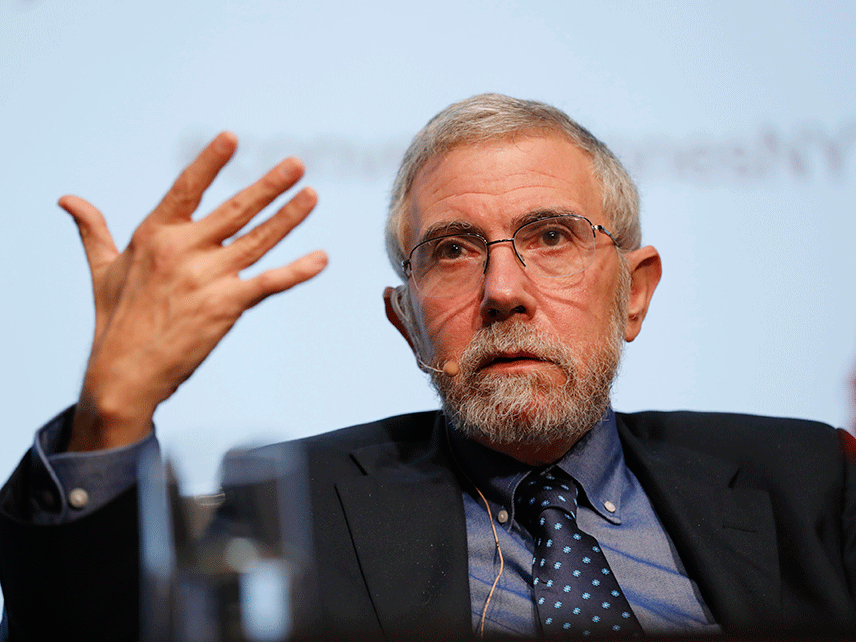Sorry, Paul Krugman, the Government Shutdown Is No Great Libertarian Experiment
Trump's shutdown is a temporary, political fight that won't save any money or reduce the size of government.

In The New York Times, columnist Paul Krugman declares that the current government shutdown can be understood as "a big, beautiful libertarian experiment." Government programs have been forced to pause, federal workers aren't being paid, the swamp of Washington is relatively quiet. Isn't this exactly what libertarians want?
Even Krugman understands that it isn't. As he acknowledges in the column, the sudden nature of a shutdown like this means private sector companies that might take over some of the federal government's current activities "don't exist now and can't be conjured up in a matter of weeks. So even true libertarians wouldn't necessarily celebrate a sudden government shutdown." To be clear: A temporary, unplanned shutdown of an undetermined length that probably won't save money is not what most libertarians have in mind when they talk about limited government.
For one thing, shutdowns like this one are shortlived and limited in scope: During the shutdown, much of the government—including automatic spending on the major entitlement programs that make up the bulk of government spending and the biggest drivers of long-term debt—remains open. And although it is at least theoretically possible that the impasse lasts for months, it increasingly looks as if President Donald Trump will declare a state of emergency, continue fighting for a border wall in the courts, and move on to ending the shutdown. So whether it lasts another two days or another two months, the rest of the government will eventually reopen. When it does, no significant long-term progress toward reducing the size of government will have been made.
Federal workers affected by the shutdown are almost certain to eventually receive backpay. That's what happened during previous shutdowns, and given that the Senate has already approved a backpay resolution for after the current shutdown ends, that's what is likely to happen this time as well.
At the same time, the federal government will, by law, owe interest on contract payments and other fiscal obligations it didn't meet during the shutdown. Which means that ultimately, the shutdown won't save taxpayers money. If anything, it might actually cost more than if the government had stayed open.
There's also public opinion to consider: Government shutdowns tend to be unpopular, and, if anything, drive support for expanding government.
Consider what happened in October 2013, when Sen. Ted Cruz (R–Texas) led a push to shut down the government over Obamacare.
The shutdown started the same day that the health law's insurance exchanges opened for business. The federal exchange system, however, crashed on launch and was barely operable for months. But initially, the shutdown drew more attention, and Obamacare, despite its obvious technical problems, actually grew more popular.
It's not too hard to imagine that keeping the government open would have led to even more intense scrutiny and criticism of the exchange failures, and stronger out-of-the-gate public disapproval. Instead, the shutdown served as a distraction. Forcing a shutdown was meant to serve as an impediment to Obamacare, but it probably made no difference, and might have been an own goal.
Which illustrates the biggest problem with shutdowns: As a tool for promoting limited government, they are nearly always tactically ineffective.
That's why I largely agree with Jeff Miron, the director of economic studies at the libertarian Cato Institute, when he writes at Vox that "shutdowns distract from the serious conversations that need to be had about fiscal reform and the size of government."
That's particularly true of this shutdown, which is happening mostly because President Trump is demanding roughly $5 billion for a border wall (sorry, "steel barrier"). The border wall is a pointless boondoggle, premised on lies, that Trump wants mainly to fulfill an insipid campaign promise. The showdown over the wall is a partisan food fight, not a way of drawing attention to the problems with a government that is too expensive and too powerful.
Yes, some libertarians might appreciate shutdowns as form of political theater, but if your goal is to actually reduce the size of government, mere theatrics won't get you very far. As Miron writes, "libertarians will only succeed in reducing the size of government when they convince non-libertarians that smaller government is better. A government shutdown does little to nothing to change minds." If anything, the opposite is true. A shutdown comes across as chaotic, and creates the opportunity for someone like Krugman to declare that this haphazard, partial government closure is a demonstration of an ideal libertarian government.
The government should be smaller on a permanent basis, ideally with public buy-in and plenty of time for everyone to prepare. A shutdown that hijacks the federal government's broken budget process so the president can make a futile attempt to fulfill a foolish and wasteful campaign promise is little more than a cheap political stunt, not a substantive libertarian victory.


Show Comments (290)